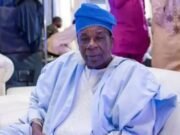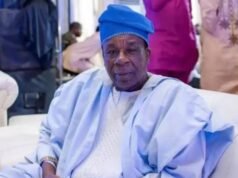This piece by PUNCH examines what led to Governor Abiola Ajimobi’s loss in last week’s National Assembly election.
Governors and ex-governors are powerful forces in Nigerian elections. To a large extent, they determine the candidates who lose and win elections in their respective states, be it in presidential, governorship, National Assembly or state assembly polls.
This explains why most governors and former governors who contest senatorial elections after their sojourn in government houses often coast to victory.
However, the February 23, 2019 National Assembly election was a major exception! The election recorded perhaps the highest number of ex-governors and governors who lost their bid to either go or return to the Senate.
At least, eight incumbent governors and ex-governors lost in the last Saturday senatorial election. This comprises six ex-governors and two serving governors.
The two incumbent governors who lost in the senatorial election are Abiola Ajumobi of Oyo State and Ibrahim Dankwambo of Gombe State.
Most governors rounding off their second term usually aim to be elected to the Senate and this has become a trend among most governors who view the Red Chamber as a “retirement home.”
Abiola Ajimobi, the outgoing governor of Oyo State, lost the Oyo South Senatorial District election to the candidate of the PDP, Kola Balogun, last weekend.
Balogun garnered 105, 716 votes to defeat the APC candidate, Ajimobi, who got 92, 218.
In 2003, Ajimobi who had just retired from the oil sector won the support of critical stakeholders including late Lam Adesina and won his bid for the Oyo South Senatorial District.
In 2011, top politicians, businessmen and traditional rulers became disenchanted with Adebayo Alao-Akala’s administration and supported Ajimobi under the platform of the Action Congress of Nigeria to become the governor.
He won the election, beating the incumbent governor, the first time in the history of the Pacesetter state.
Again, in 2015, Ajimobi became the ‘Koseleri’ (unprecedented) as he won the elusive second term ticket hitherto deprived all his predecessors from the days of Chief Bola Ige in the Second Republic.
At every forum, till last weekend when he lost the senatorial ticket, Ajimobi flaunted his koseleri title.
The governor appeared looming too large to the extent that he elevated and enthroned 21 kings in a day in 2017, against the tradition of Ibadan and without recourse to the Olubadan, Oba Saliu Adetunji, who had since then fallen out with the power-that-be in the state.
The governor’s indifference to state workers’ plight especially those in the institutions of higher learning being owed between three and 18 months salary arrears were among the factors that led to his downfall, according to political observers.
Another major factor was the intra party crisis that rocked the APC in the state, which made a group within the party to leave en masse for another party.
A social critic and chieftain of the APC in the Ibadan North Local Government Area, Alhaji Ismaila Ashipa, described the governor’s human management skill as zero.
He said, “He fought many wars at the same time; his know it all mien-he doesn’t listen to advice. He ran a government without human face.”
Ashipa who said he had since Sunday night left the APC after delivering his ward to the party, added, “Low morale of party executive and members, the governor’s pomposity and holier than thou attitude, poor funding of election, and reliance on ‘pari ise’ for polls made him to lose.”
In his comments, a journalist and political observer, Mr. Ademola Adejuyigbe, said, “Ajimobi had vowed not to seek election again in 2016. His decision to bid for the Senate came late, having failed to take certain factors into consideration. For instance if he had anticipated Ibadan protest votes over Obaship, he ought to have reached out to the Ibarapa people long before now in appointments and projects.
“I am aware of three protest letters from Ibarapa over his lopsided appointments and dearth of meaningful projects in the area except for the Ibarapa Poly.
A political analyst, Babajide Ilori, claimed that the governor lost because of pride, adding that, “people got tired of him. There is a trend coming up about people voting out leaders who underperformed.”
A broadcaster (name withheld), said, “The anti-Buhari sentiment in Oyo State and Atiku’s surge in addition to the public disdain for his perceived arrogance, serial caustic outbursts and penchant for playing God, especially partial demolition of Fresh FM station, Ibadan, in flagrant disobedience to court’s order, contributed to his failure”.
Another contributor, Adedokun Aderibigbe, also said arrogance and Atiku Abubakar factor as well as over confidence on the part of the governor led to his downfall.
But the APC spokesman in the state, Dr. Abdulazeez Olatunde, disagreed with the respondents’ claims, insisting that the governor lost because of massive rigging by the PDP.
He said, “The governor did not lose because of the too many battles people highlighted, but for the massive rigging that took place in Ibadan Northeast, Ibadan Northwest, Ibarapa North and Ibarapa East.”



































